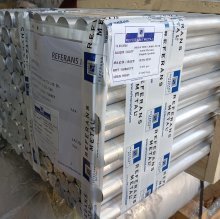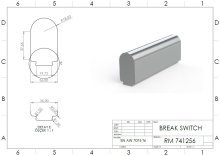



Plates
Sheets
Rod/Round Bar/Flat Bar
Tube/Extrusions/Profile
1060
ASTM B209 / Al99.6 / 1060 / H24
| Chemical Properties | % Value |
| Silicon (Si) | 0,00 - 0,25 |
| Manganese (Mn) | 0,00 - 0,03 |
| Magnesium (Mg) | 0,00 - 0,03 |
| Copper (Cu) | 0,00 - 0,03 |
| Titanium (Ti) | 0,00 - 0,03 |
| Iron (Fe) | 0,00 - 0,35 |
| Zinc (Zn) | 0,00 - 0,05 |
| Aluminium (Al) | Balance |
| Physical Properties | Value |
| Density | 2.705 g/cm³ |
| Melting Point | 646 °C |
| Thermal Expansion | 23.6 µm/m.°C |
| Modulus of Elasticity | 68 GPa |
| Thermal Conductivity | 230 W/m.K |
| Electrical Resistivity | 62% IACS |
| Mechanical Properties | Value |
| Proof Strength | 78 MPa |
| Yield Strength | 99 MPa |
| Shear Strength | 48 MPa |
| Elongation A50 mm | 1% |
| Hardness | 35 HB |
The 1060 H24 aluminum alloy is known for its excellent machinability, lightweight nature, and good corrosion resistance. As one of the pure aluminum alloys, it is commonly used in applications that require low strength. The H24 temper indicates that the alloy is cold-worked and has medium hardness, which provides it with durability. Additionally, it offers properties such as electrical and thermal conductivity, making it widely used in electrical equipment and heat-sensitive components.
The 1060 H24 aluminum alloy is highly suitable for anodizing. The anodizing process creates a protective oxide layer on the surface, which enhances its corrosion resistance and provides an aesthetically pleasing finish. This makes it ideal for applications requiring durable and decorative surfaces. In terms of weldability, the 1060 H24 alloy performs well. Being a relatively pure form of aluminum, it is easy to weld, and with proper techniques, strong and reliable welds can be achieved.
Regarding bending and forming, the 1060 H24 alloy is very versatile due to its excellent machinability. It performs well in shaping and bending operations, making it ideal for use in automotive, construction, and packaging industries. However, its use in high-vibration environments is limited. Due to its relatively low strength, it is not suitable for applications requiring resistance to high stress or vibrations.
In terms of corrosion resistance, the 1060 H24 alloy is highly resistant to atmospheric conditions, water, and moisture, thanks to its pure aluminum content. However, due to its low strength, it is not suitable for heavy-load applications or environments with high temperatures. The advantages of 1060 H24 include excellent machinability, anodizing compatibility, and corrosion resistance, while its drawbacks include low strength and limited performance in high-vibration environments.
Choosing Factors for 1060 H24
- Strength: Moderate
- Machining: Weak
- Weldability: Excellent
- Formability: Good
- Corrosion Resistance: Exquisite
- Heat Treating: Yes
Some Well-Known Applications for 1060 H24
In kitchen ware,
As a component of pressure vessels,
Also it is used in the structure of chemical equipments.
- Plate

 Weight Calculator
Weight Calculator

